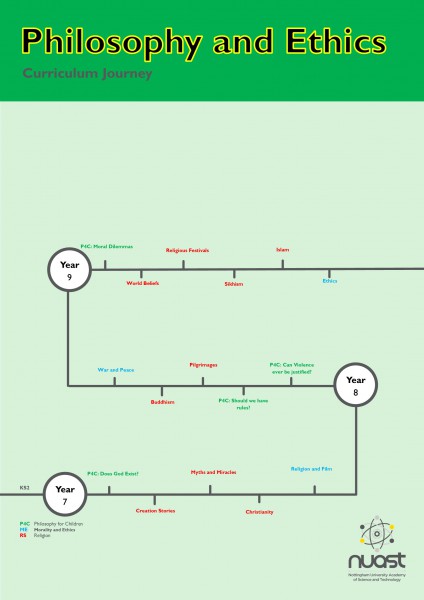Philosophy and Ethics
Curriculum Journey
Curriculum Intent: Philosophy and Ethics
Philosophy uses the tools of logic and reason to analyse the ways in which humans experience the world. Philosophy teaches us how to write clearly, and to read closely, with a critical eye; so that we can spot bad reasoning, and how to avoid it in our own work.
Philosophy and Ethics at NUAST develops students into tolerant, kind, inclusive and non-judgmental individuals who understand more about themselves, each other and the world we share. Whilst our curriculum meets the statutory requirement of the Nottinghamshire agreed syllabus to provide Religious Education, Philosophy and Ethics is not exclusive to religion. We encourage all students to be independent ‘big thinkers’ by engaging in healthy discussion and debate, present reasoned arguments and respectfully question ideas, in essence they will learn to argue politely.
Students’ cultural capital is broadened through their experiences of different religious, moral and ethical opinions through discussion. By studying Philosophy and Ethics we develop moral and empathetic citizens capable of functioning effectively in our diverse world and workplaces.
Key Stage 3
Philosophy and Ethics is currently offered in year 7 and year 8 expanding into year 9 as the school grows over the coming years.
The intent and purpose of Philosophy and Ethics is not to promote a particular faith but to allow learners to develop into tolerant, kind, inclusive and non-judgmental individuals who understand more about themselves, each other and the world we share. We aim to do this by providing a relevant curriculum across the key stage that pupils will engage with and which will develop their higher order thinking skills. We aim to promote community cohesion and provide pupils with opportunities to explore diversity of thought, develop their own opinions on key issues and evaluate different points of view.
Philosophy for Children (P4C) has been introduced in the first term of each year group, it encourages all students to be independent ‘big thinkers’ by engaging in healthy discussion and debate, present reasoned arguments and respectfully question ideas, in essence they will learn to argue politely with appropriate language. These critical thinking skills are then applied and interleaved into later topics to consolidate understanding and further develop transferable skills but also provide students with the skills to be a moral and empathetic citizen capable of functioning in our diverse world and workplaces.
Year 7
In year 7 students are delivered a curriculum that aims to inspire and educate students in modern and traditional concepts of Philosophy and Ethics allowing students to investigate, interpret and inquire about different ideas and theories. Year 7 Philosophy and Ethics covers topics such as:
- P4C: Looking for meaning
- Creation stories
- Myths and Miracles
- Christianity
- Religion and morals in the Movies
Year 8
In year 8 students are delivered a curriculum that builds on the aims of year 7 to inspire and educate students in modern and traditional concepts of Philosophy and Ethics allowing students to investigate, interpret and inquire about different ideas and theories. Year 8 Philosophy and Ethics covers topics such as:
- P4C:Right and wrong
- P4C: Should we be governed?
- Pilgrimages
- Buddhism
- War and Peace
Links
Key Stage 3

